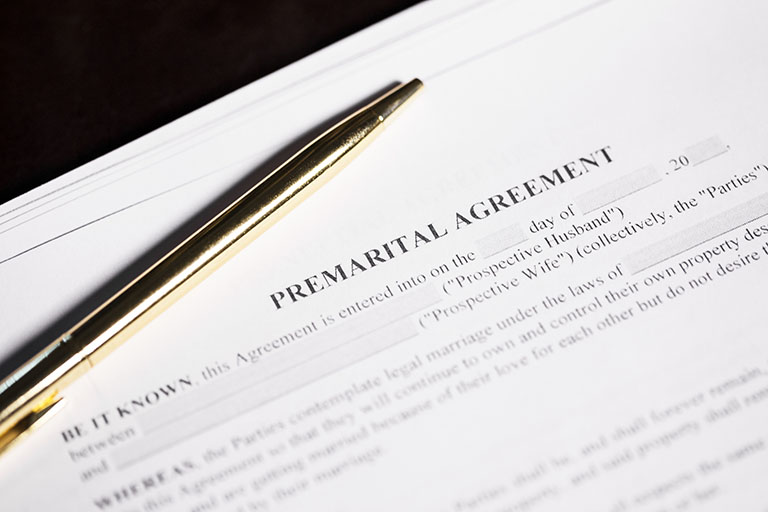Prenuptial/Postnuptial Agreements Lawyer
Protecting Your Assets Before Or After Your Wedding

If you’re planning on getting married or are already married, a prenuptial agreement or postnuptial agreement can outline property division and spousal support in a divorce or legal separation.
Prenuptial and postnuptial agreements are essential for clients with significant assets or debts before and after marriage. Circumstances like having a prior divorce or children from a previous marriage may justify the cost and effort of getting the agreement.
An experienced family law attorney and paralegal from Lewellen | Strebe | Hopper Family Law Group can help you draft an agreement that fits your circumstances.
Schedule Your Free Prenuptial Or Postnuptial Agreement Consultation Today.
What Is A Prenuptial Agreement?
A prenuptial agreement, also known as a premarital agreement or prenup, is a legal contract that two parties sign before entering the institution of marriage. If drafted correctly, the contract dictates what will happen with a couple’s assets and debts should the marriage end in a divorce. This can take a lot of the uncertainty out of the question when facing a divorce.
What Is A Postnuptial Agreement?
A prenuptial agreement is protected under California Family Code Section 1615, but a postnuptial agreement is not. It’s a contract entered into by people who are already married and wish to establish changes to community property and separate property and other rights and obligations.
For postnuptial agreements to be valid and enforceable, each spouse must provide full and fair disclosure of their assets, debts, income, and obligations.
Spouses must be fully aware of the entire circumstances of the marriage and what the community (couple) acquired from the date of marriage.
Finally, a postnuptial agreement must have “consideration” to be valid. This can often come in the form of a dismissed dissolution of marriage action and decision to reconcile, but with terms of the postnuptial agreement in place.
Proven Prenuptial/Postnuptial Agreement Process
Clients seeking prenuptial agreements or postnuptial agreements can rely on an experienced family law attorney from Lewellen | Strebe | Hopper Family Law Group. You will receive legal advice based on years of representing clients just like you to protect your rights and remain safe should a divorce occur. While each client’s agreement is unique based on their assets, owning a business, and debt, we craft agreements for each specific situation, and we start each agreement with our proven process, which includes:

Free Initial consultation
Prenuptial and postnuptial agreements are binding contracts that can be intimidating and confusing, so understanding your rights and the legal process is key to an equitable agreement. Our free initial one-hour consultation allows you to get to know our law firm and attorneys, who take the time to listen to your concerns and answer your questions. We offer a free initial consultation rather than charge our potential new clients for learning about our firm and how we can serve them. It is a small way we can help people who may not be able to afford to hire an attorney.

Establish Goals & Method
From the very beginning, you meet with either Kimberly Lewellen, Michael Strebe, Jason Hopper, Theresita Perez, Laura Matsie Chickering, or Morgan Montoya, who will work directly with you when you choose to have us represent you. They examine the unique issues surrounding your prenuptial or postnuptial agreement and work with you to establish the goals and identify legal tools to best achieve them.

Prepare A Contract
Once we understand all your premarital or marital property, we prepare an equitable agreement for both parties to review that accounts for all the documents and documentation the California Family Courts will require in the event of a divorce.

We Aggressively Represent You in Court
If your marriage ends, you can have peace of mind that you can return to a family law firm with years of experience in negotiating, arguing for, and attaining results that are in the best interest of our clients and their families.
Kim is Cooperative and Strategic
“Kim is an amazing attorney. She is cooperative, strategic, and fierce at the same time. You will be in amazing hands with Kim.” ~ Avvo
Protect Your Assets In Case Of Divorce.
Additional Family Law Services We Provide
Almost 10 percent of marriages in California end in divorce, according to 2021 data from the World Population Review. Our family law attorneys and professionals provide our clients with an exceptional depth of experience handling cases involving a wide range of legal issues, including:
- Child Custody
- Child Support
- Domestic Abuse
- Division of Property
- International or Out-Of-State Removal of Minor Children
- Spousal Support
- Legal Separation
- Mediation
Frequently Asked Questions About Prenuptial & Postnuptial Agreements
What Is California's Premarital Agreement Law?
California’s Uniform Premarital Agreement Act (UPAA) outlines the rules and requirements for prenuptial agreements. Properties in a prenup can include real estate, financial interests, income, earnings, debts, and other present or future assets. According to the UPAA, for a prenuptial agreement to be valid, it cannot include:
- Anything regarding child custody or child support
- Spousal maintenance requirements (unless the affected spouse is represented by legal counsel)
- Any requirements for one spouse to commit illegal acts
- Unfair, unjust, exploitive, or deceptive terms
- Non-financial requirements
- Terms regarding the relationship
California courts will not enforce verbal prenuptial agreements. If a spouse wishes to enforce the terms of a prenup, they must have a written, signed, and notarized legal document.
California law also requires a minimum of a 7 day review period from the date the final draft of the prenuptial agreement is agreed upon to the date the prenuptial agreement is signed by the parties. Failure to honor the review period can cause the prenuptial agreement to be deemed invalid.
How Long Does It Take To Draft a Prenuptial Or Postnuptial Agreement?
The timeframe to get a prenup can depend on the negotiation between your lawyer and your future spouse’s lawyer.
California law requires a waiting period of seven days from the final draft before both parties can sign the document.
For postnuptial agreements, a contract for a high-asset couple will take, on average, two to four months.
If You Don't Make a Prenup or Postnup
If you opt not to get prenuptial or postnuptial agreements, you’re leaving your divorce settlement in the hands of the California courts.
Even with the best divorce attorney, your marital assets are considered community property, entitling the other spouse to property rights during divorce proceedings.
If you move to another state, even if a couple has a prenuptial agreement, a person can have their property seized in divorce. According to a state’s laws, property acquired during a marriage may be called marital or community property. State law can have an influence over how property is transferred after a marriage. Under the law, marriage is an arrangement between the couple, and the marriage has an automatic right of property.